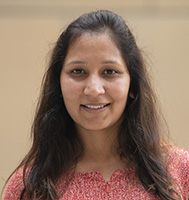Meha Kabra, PhD
Position title: Scientist I
Email: mkabra2@wisc.edu
Address:
Division of Neonatology and Newborn Nursery
200 N Charter St, #112

Education
BSc, Holkar Science College, Indore, Madhya Pradesh, India
MSc, Vellore Institute of Technology, Tamil Nadu, India
PhD, L V Prasad Eye Institute, Hyderabad, India
Professional Activities
Dr. Meha Kabra is Scientist I in the Division of Neonatology and Newborn Nursery. Kabra’s focus is on understanding the genetic etiology of pediatric ocular diseases, particularly those caused by ion channel dysfunctions. Her work spans both basic and translational research, with a focus on developing CRISPR genome editing, gene augmentation therapy and Anticodon-engineered tRNA approaches to treat retinal dystrophies like Leber Congenital Amaurosis 16 (LCA16), Congenital Stationary Night Blindness (CSNB2) etc. Kabra has contributed to the investigation of novel therapeutic strategies for ocular channelopathies at the University of Wisconsin-Madison and committed to advancing the cutting-edge research in genome editing therapies for improving and restoring the visual functions.
Research Interests
Kabra’s research seeks to understand the genetic underpinnings of blinding diseases caused by ion channel dysfunctions. Her primary focus is to investigating the potential of CRISPR genome editing (base editing and prime editing) therapies for the treatment of inherited retinal blinding diseases. She has demonstrated that the non-viral delivery of CRISPR base editors to retinal pigmented epithelium correct the point mutation in KCNJ13 gene (Leber Congenital Amaurosis 16; LCA16) and restore the ion channel functions. Currently, she is exploring the viral delivery (Single AAV-mediated) of genome editor for targeting of photoreceptors and iPSC-derived retinal pigmented epithelium to treat conditions like Congenital Stationary Night Blindness (CSNB2) and Best Diseases. Additionally, Kabra is interested in gene augmentation therapy and anticodon-engineered tRNA (ACE-tRNA) therapies for ocular channelopathies and assess the functional outcomes using electrophysiology. Her long-term goal is to conduct translational research to better understand disease mechanisms and develop potential therapies for blinding ocular diseases